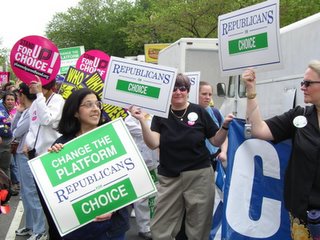Anti-Choice & Anti-Birth Control
"Their [anti-choice organizations] aim is not about reducing abortion -- it includes restricting people's access to contraception, it includes transforming our sex lives, it includes transforming our families. That's the goal, and [restricting abortion] is just one vehicle toward that end."
-Cristina Page, author of How the Pro-Choice Movement Saved America: Freedom, Politics, and the War on Sex
In her book, Page argues that the pro-choice movement is "doing a better job at what the public understands to be the pro-life agenda than the pro-lifers are." Unlike the "pro-life" movement, pro-choice organizations are dramatically reducing the number of abortions and fighting for pro-family, pro-child policies. Read an AlterNet interview with Page here:



Page, a veteran of the editorial departments of Glamour and Ms. magazines, and the current vice president of the Institute for Reproductive Health Access at NARAL Pro-Choice New York, describes how she had been searching for a pro-life counterpart with whom she could engage in a reasoned, honest search for common ground. She found one: a feminist-identified woman who worked for a Right to Life chapter, and on the 30th anniversary of Roe v. Wade in 2003, they published a jointly authored op-ed in the New York Times.It's time for politicians and activists who are in favor of keeping abortion safe, legal and rare to expose these hypocritical anti-contraception "pro-lifers."
"The Right to Agree" laid out a series of shared goals, including pro-family and pro-child policies like affordable child care and support for single mothers, an end to violence and violent language in the abortion debate, and the adoption of legislation mandating that health insurance cover contraceptives. While pro-choicers responded with mild support, pro-lifers were outraged, particularly at the statement of support for broad access to contraception. It was then that Page realized that the anti-contraception pro-lifers were not, as she'd assumed, on the fringe of the movement but rather the ones who set its agenda.
Referring to the book's relatively slim profile (it weighs in at just 236 pages), Page described it as "in many ways a breezy tour through frightening truths," but How the Pro-Choice Movement Saved America is tenaciously researched and extensively documented (40 of those pages are endnotes). Digging deep into the evidence, Page unveils the hidden anti-contraception agenda of the pro-life movement and outlines how how close we are to losing not only the constitutional right to abortion provided by Roe but also our rights to safe, accessible contraception.



6 Comments:
I was there. It was an amazing march. I've been meaning to buy this book.
Republicans for choice? Where are they today????
A couple questions:
Is abortion in society's interest?
Can a society become more Muslim in its demographic character without also becoming more Muslim in its political and civil character?
Answers here:
http://www.theaustralian.news.com.au/common/story_page/0,5744,18159605%255E7583,00.html
The abortion issue and the demographic issue are intertwined. And like it or not, self-extenction does have it's consequences.
Bruce Bawer, a gay man who recently wrote "Stealing Jesus" (about Christian fundamentalist's intolerance in America) just came out with this book...
http://www.amazon.com/gp/product/0385514727/102-4661607-7595319?n=283155
The questions I'm curious to ask you pro-choicers: Does the effect of abortion and birth control on demographics concern you at all?
Does anyone even talk about it?
If you look at trends, middle/upper class women living in metropolitian cities are having fewer children, while lower-income women are having more children.
Someone in the GOP once said, abortion will never be outlawed because we don't like social programs and we don't want welfare to grow. That's the reality.
Someone in the GOP once said, abortion will never be outlawed because we don't like social programs and we don't want welfare to grow. That's the reality.
If that's the reality, then pro-choicers can't go wrong voting for GOP candidates.
Post a Comment
<< Home